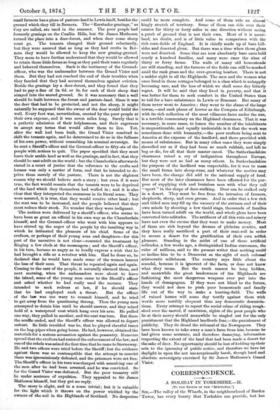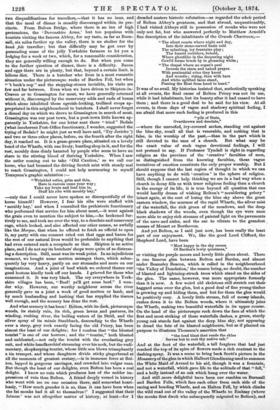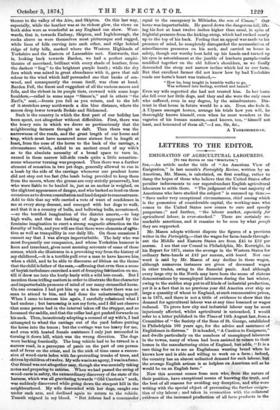CORRESPONDENCE.
two disqualifications for travellers,—that it has no inns, and that the meal of dinner is steadily discouraged within its pre- cincts. From Bolton Bridge, where there is an inn of high
pretensions, the Devonshire Arms,' but too populous with tourists visiting the famous Abbey, for my taste, as far as Burn- sail, six miles further up the valley, there is no shelter for the bond fide traveller ; but that difficulty may be got over by persuading some of the jolly Yorkshire farmers to let you a lodging for a week or two, which, for a reasonable consideration, they are generally willing enough to do. But when you come to the further question of dinner, there is a difficulty. Bacon and eggs there are in plenty, but that, beyond a certain limit, is bilious diet. There is a butcher who lives in a most romantic situation under the picturesque rocks of Barden Fell, but when "'t beck's oop " and the stepping-stones invisible, his visits are few and far between. Even when we have driven to Skipton-in- Craven or to Grassington for meat, we have generally returned without it, discouraged by the unsavoury odds and ends of bones which alone inhabited those ogreish-looking, trellised coops ap- propriated in this neighbourhood to butchers. I shall never forget a dismal day on which we drove to Grassington in search of meat. Grassington was our post town, but a post-town little known ap- parently in Yorkshire, for one letter sent there " tried " Bedale (what incoherent Post-Office functionary, I wonder, suggested the trying of Bedale? he might just as well have said, 'Try Jericho ') and two or three other places, before, on the fourth after the right day, it reached us. It is a grass-grown place, situated on a lovely bend of the Wharfe, with one lively, bustling shop in it, and for the rest, mouldy dens dimly haunted by people who seem to have no share in the stirring blood of thriving Yorkshire. When I saw the ostler coming out to take Old Caution,' as we call our horse, who had breasted the driving Scotch mist with steady zeal to reach Grassington, I could not help murmuring to myself Tennyson's graphic salutation :—
" Wrinkled ostler, grim and thin, Here is custom come your way ; Take my brute and lead him in, Stuff his ribs with mouldy hay,"
—only that I could never have spoken so disrespectfully of the horse himself ! However, I fear his ribs were stuffed with ' mouldy hay,' and when I consulted the prehistoric functionary who performed that service for him about meat,—it went against
the grain even to mention the subject to him,—he beckoned fur- tively to me, and took me over the way, to a desolate and unsavoury cage, which looked, and also affected our other senses, so awfully like the Morgue, that when he offered to fetch an official to open it, my party with one consent cried out that eggs and bacon for the rest of our natural lives would be preferable to anything that had even entered such a receptacle as that. Skipton is an active place, and I do not say its butchers' shops were quite of so distress- ing a description. Still, meat was its weak point. In an injudicious moment, we bought some mutton sausages there, which subse- quently lay very heavy, partly on our stomachs and more on our imaginations. And a joint of beef which we ordered thence our good hostess kindly took off our hands. I grieved for those who consumed it. It was very black. The cry everywhere in York- shire villages has been, " Beef ! ye'll get none beef." I won- der why. However, our worthy neighbour across the river generally gave us a joint a week of good mutton or lamb, and by much husbanding and hashing that has supplied the tissues well enough, and the scenery has done the rest.
And what scenery it has been ! Bolton, with its dark, picturesque woods, its stately ruin, its rich, green lawns and pastures, its winding, rushing river, the boiling waters of its Strid, and the silver spray of its mimic Staubbach, descending to the Wharfe over a steep, grey rock exactly facing the old Priory, has been almost the least of our delights; for I confess that "the bloated tourist " is one of our horrors ; and the " tourist," both bloated and unbloated,—not only the tourist with the everlasting grey suit, and white handkerchief streaming over his neck, but the rudi- mentary, shopkeeping tourist, whose little son blows triumphantly a tin trumpet, and whose daughters divide sticky gingerbread at all the moments of greatest ecstasy,—is in immense force at Bol- ton, lapped in gorgeous carriages, and crowded into vulgar vans. But though the least of our delights, even Bolton has been a real delight. I know no ruin which produces less of the sadder im- pressions of ruin than Bolton. A friend deeply versed in history who went with me on one occasion there, said somewhat heart- lessly, " How much grander it is so, than it can have been when the fat monks had it all to themselves !' I suggested that their fatness' was not altogether matter of history, at least—for I
dreaded austere historic refutation—as regarded the whole period of Bolton Abbey's greatness, and that abroad, unquestionably, I had visited Abbeys still in possession of monks who were not only not fat, but who answered perfectly to Matthew Arnold's fine description of the inhabitants of the Grande Chartreuse,— "The silent courts where night and day, Into their stone-carved basin cold The splashing, icy fountains play ; The humid corridors, behold,
Where ghostlike in the deepening night Cowl'd forms brush by in gleaming white ; " The chapel whore no organ's peal Invests the stern and naked prayer. With penitential cries they kneel And wrestle ; rising. then with bare And white uplifted faces stand, Passing the Host from hand to hand."
It was of no avail. My historian insisted that, aesthetically speaking at all events, the final cause of Bolton Priory was not its use, while it had inhabitants, but its beauty after it had ceased to have them ; and there is a good deal to be said for his view. At all events, in these days of vague and shadowy spiritual feeling, I am afraid that more such feeling is produced in this
"pile of State,
Overthrown and desolate,"
—where the unroofed, ivy-covered arches, standing out against the blue sky, recall all that is venerable, and nothing that is false, in the worship of the past,—than in the part which is still devoted to the uses of a church. But what may be the exact value of such vague devotional feelings, I will not pretend to say. If Professor Tyndall is right in regarding religion as the province of the ' creative' faculties of men, as distinguished from the knowing faculties, these vague tentatives of emotion constitute the only proper worship. But I should suppose that the last region of thought in which we can have anything to do with ' creation' is the sphere of religion. Still, though I cannot help thinking we are in a bad way when a church in decay fills us with truer religious feeling than a church in the energy of its life, it is true beyond all question that one would hardly dream of wishing Bolton's " mouldering priory " intact again, at the cost of losing the blue sky above the great eastern window, the murmur of the rapid Wharfe, the silver mist of the waterfall, the rich green of the meadows, and the deep black shadows of the woods, even though the eye were once more able to enjoy rich streams of painted light on the pavements of the nave and aisles, and the ear to vibrate to the grandest
ma.s.ses of Mozart or Beethoven.
And yet Bolton, as I said just now, has been really the least part of our enjoyment. We, like the good Lord Clifford, the Shepherd Lord, have been
"Most happy in the shy recess
Of Barden's lowly quietness,"
or visiting the purple moors and lovely little glens about. There is one famous glen between Bolton and Barden, and almost under Beamsley Beacon, which is called in the neighbourhood 'the Valley of Desolation,' the reason being, no doubt, the number of blasted and lightning-struck trees which stand on the sides of the glen. The name, however, was more appropriate formerly than it is now. A few weird old skeletons still stretch out their haggard arms over the glen, but a good deal of fine young timber is growing up and hiding them, and but for them the glen would be positively cosy. A lovely little stream, full of mossy islands, rushes down it to the Bolton woods, where it ultimately joins the Wharfe, making two beautiful waterfalls in its upper course. On the head of the picturesque rock down the face of which the first and most striking of these waterfalls dashes, a green, sturdy young oak stands fast against the deep blue sky, not appearing to dread the fate of its blasted neighbours, but as if planted on purpose to illustrate Thomson's assertion that
"the loud blast that rends the skies Serves but to root thy native oak."
And at the foot of the waterfall, a tall foxglove that had just reached the top of its spire of flowers made a rich contrast to the dashing spray. It was a scene to bring back Scott's picture in the Monastery of the glen in which Halbert Glendinningusedto summon the White Maid of Avenel to his aid, though it was a fountain, and not a waterfall, which gave life to the solitude of that "fell," and a holly instead of an oak which hung over the water.
And still more delightful have been our rambles on Burnsall and Barden Fells, which face each other from each side of the racing and bending Wharfe, and on Halton Fell, by which climbs the wild road out of the valley of the Wharfe to Embsay (where the monks first dwelt who subsequently migrated to Bolton), and thence to the valley of the Aire, and Skipton. On this last way, especially, while the heather was at its richest glow, the views on both sides were as wonderful as any England can show. West- wards, that is, towards Embsay, Skipton, and Ingleborough, the rocks above us were themselves most picturesque and rugged, while lines of fells curving into each other, and ridge behind ridge of lofty hills, marked where the Western Highlands of Yorkshire and the Eastern of Lancashire met. Eastwards, that is, looking back towards Barden, we had a perfect amphi- theatre of moorland, brilliant with every shade of heather, from the darkest " ling " to the brightest purple heath ; while the dry fern which was mixed in great abundance with it, gave that salt odour to the wind which half persuaded one that banks of sea- weed, and consequently the ocean itself, was close at hand. Barden Fell, the finest and ruggedest of all the various moors and -fells, and the richest in its purple tints, crowned with some huge boulders,—called in some maps " Simon's," and in others "the Earl's," seat,—fronts you full as you return, and to the left of it stretches away northwards a dim blue distance, where the moors drop lower towards Bedale and Richmond.
Such is the country in which the first part of our holiday has been spent, not altogether without difficulties. First, there was the heavy rain in which we drove so pertinaciously that the neighbouring farmers thought us daft. Then there was the narrowness of the roads, and the great length of our horse and trap, which must have measured some sixteen feet in length at least, from the nose of the horse to the back of the carriage, a -circumstance which, added to an ancient creed of my wife's as to the absolute necessity of a broad space to turn in, caused in these narrow hill-side roads quite a little sensation- scene whenever turning was proposed. Then there was a further element of sensation in two pet dogs, generally allowed to run in -a leash by the side of the carriage whenever our prudent horse did not step out too fast (the leash being provided to keep them from the moors, where the grouse are very strictly preserved), but 'who were liable to be hauled in, just as an anchor is weighed, on -the slightest appearance of danger, and who barked so loud on these -occasions as to drown consultation and lend despair to remonstrance. Add to this that my wife carried a vote of want of confidence in me at every steep descent, and emerged with her dogs to walk, and that it is a country of bulls, and bellowing bulls, accustomed, —so the terrified imagination of the district asserts,—to leap high walls, and that the barking of dogs is supposed by the feminine imagination to exert a strong magnetic attraction on the ferocity of bulls, and you will see that there were elements of agita- tion as well as tranquillity in our daily life. On these occasions I `cannot say that I was always imperturbable. The lady who was most frequently our companion, and whose Yorkshire humour is ]Teen and trenchant, gives most amusing accounts of some of these -scenes, which she illustrates in a provoking way from the history of my childhood,—it is a terrible pull over a man to have known him when a child, and to be able to discourse ad libitum on the theme- -that the child is father of the man,—affarming that even then a scene .of boyish turbulence exercised a sort of frenzying fascination on me, till it drew me into the hurly-burly with a wild hoo-roosh. But I mention these trifling matters in order to illustrate the fine character and imperturbable presence of mind of our many-counselled horse. On one occasion I had put him up at a farm where there was no maan to attend to him, and had done the unharnessing myself. When I came to harness him again, I carefully refastened what I 'had undone ; but harnessing is not my forte, and I did not observe that some person had in the interval taken off the crupper, and so loosened the saddle, and that the collar had got pushed forwards on his neck. Then, incautiously adopting a counsel of my wife's, I had attempted to wheel the carriage out of the yard before putting the horse into the traces ; but the carriage was too heavy for me, and even with heated female assistance I only just succeeded in turning it down hill, which was the wrong direction. The dogs were barking frantically. The long vehicle had to be turned in a marrow road, in a paroxysm of panic on the part of one person .and of fever on the other, and in the nick of time came a succes- sion of wood-carts laden with far-protruding trunks of trees, and adriven by children of twelve. My wife was in an agony, I was in a fume. Our friend was not altogether easy, though she was mentally taking _notes and preparing to satirise. When we had passed the string of wood-carts in safety, the extraordinary discovery of the state of the harness, which was all gravitating towards "Old Caution's" neck, was suddenly discovered while going down the steepest hill in the neighbourhood. My wife descended with her dogs, caught one under each arm, and declined again to return to the vehicle. Tumult reigned in my blood. " But Athens had a commander
equal to the emergency in Miltiades, the son of Cimon." Our horse was imperturbable. He paced down the dangerous bill, lift- ing his feet at least twelve inches higher than usual, in spite of frightful pressure from the kicking-strap, which had rucked nearly up to the top of his back. Feeling that an appeal was made to his presence of mind, he completely disregarded the accumulation of miscellaneous pressures on his neck, and carried us home in safety, though our worthy host held up his hands and turned up his eyes in astonishment at the jumble of leathern paraphernalia muddled together on the old fellow's shoulders, as we finally descended the steep and narrow incline which led to our farm. But that excellent farmer did not know how by bad Yorkshire roads our horse's heart was trained,—
" How he, long taught in humble walks to go, Was softened into feeling, soothed and tamed."
Even my wife regretted she had not trusted him. In her baste she fell over her little dogs, and they and she were the only ones who suffered, even in any degree, by the misadventure. Dis- trust in that horse in future would be a sin. Even she feels it. A Ulysses amongst horses, arrange his trials how you will, he thoroughly knows himself, even when he most wonders at the vagaries of his human masters,—and knows, too, "himself not least, and honoured of them am, Sir, &c., A YORKSHIREM A N.




































 Previous page
Previous page